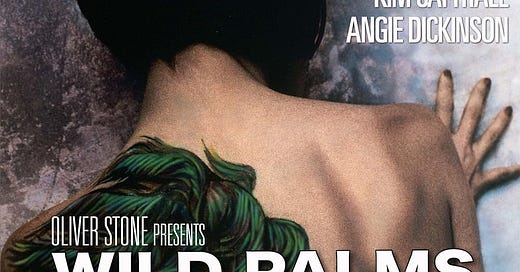The Long Tomorrow: A Warning from "Wild Palms"
In 1993, "Wild Palms" Gave Us Eli Levitt — A Man Already Trapped in the Long Tomorrow
When I was rereading The Psychological and Neurological Chasm, I found myself thinking about a television series that almost no one remembers — but maybe everyone should: Wild Palms (1993), a surreal miniseries produced by Oliver Stone and aired on ABC in the early days of digital paranoia.
(You can watch all five hours of Wild Palms here for free: Wild Palms full series.)
The total badass Jack Palance’s character, Eli Levitt, lingers in memory not because of his screen time but because of what he represents: a man who has outlived his era, his context, and possibly himself. He’s technically alive, technically aware, and still moving through the world — but he’s been hollowed out by too much knowledge, too much technology, and too much time. He exists like a ghost made of signal interference: still speaking, but not fully there.
In Wild Palms, digital resurrection, virtual memory implants, and simulated presence are all emerging technologies. The plot unfolds in a society where reality is blurring and identity can be manipulated, archived, or reconstructed. Watching it now, in 2025, it feels far less like dated cyberpunk and far more like a soft forecast of what’s coming for us — especially as we consider how tools like brain-computer interfaces, memory scaffolding, and AI-guided therapy are beginning to interfere with the emotional coherence of the self.
What The Long Tomorrow article lays out in more analytic terms — the risk that extended lifespan may outstrip the mind’s ability to remain whole — Wild Palms dramatizes with eerie precision. The show makes you feel what it means to drift from identity rather than simply decay into death. Not dementia, per se — just disintegration. Psychic latency. Emotional lag. The uncanny valley of self.
Eli Levitt, in particular, is a vision of what it might look like to survive too far into the future. Not triumphant. Not transcendent. Just ... suspended.
We talk a lot today about optimizing healthspan. But less often do we ask: What if a longer life turns us into historical or psychological or emotional anachronisms? What if we become out of step not only with culture but with our own selves?
Wild Palms didn't have the scientific language to pose those questions the way neuroscience or biotech might today. But it had the instincts. And that might be enough of a warning.




